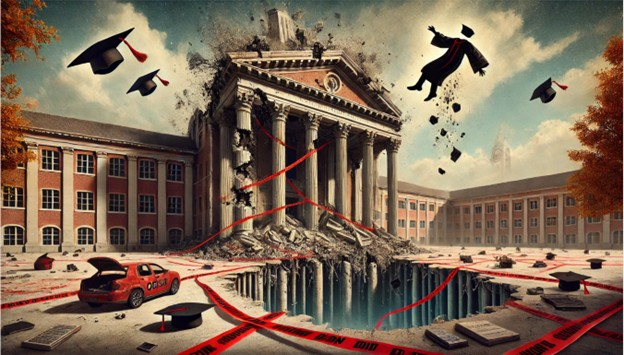Science Under Siege: How Trump’s 2025 Policies Are Unraveling Global Research and Academic Freedom
Input
Modified
Global Scientific Collapse: The Fallout of U.S. Grant Terminations The Ideological Purge of Higher Education in the United States A Future at Risk: The Global Cost of Politicized Knowledge

Global Scientific Collapse: The Fallout of U.S. Grant Terminations
In late March, as South Africa prepared to commemorate Human Rights Day, researchers at the University of the Witwatersrand were taken aback by a succession of emails that would disrupt years of their work. This occurred on a quiet Friday evening. These were not your typical administrative adjustments. The termination notices were formal, abrupt, and definitive. Their multi-million-dollar grant, which was granted by the U.S. government to investigate infectious diseases, was terminated immediately. The precipitous derailment of years—and in some cases, decades—of research on cancer, tuberculosis, and HIV.
The Wits Health Consortium had been conducting critical trials on HIV prevention, tuberculosis, and HIV-related malignancies. The majority of the research was conducted over the course of several decades. It was now being criticized for its low return on investment, being branded as irrelevant to "American health," and, most jarringly, being labeled detrimental. The research "did nothing to enhance health, lengthen life, or reduce illness," according to the cancellation letters written on behalf of the U.S. Agency for International Development.
The timing could not have been more symbolic for Dr. Ian Sanne, one of the project's primary investigators. He stated, "Ironically, our grant concluded on Human Rights Day." "That day is present to provide assistance and safeguard the vulnerable." Currently, the United States government is compelling us to take the opposite course of action. His concern was not solely about the lost funding; it was also about the clinical trial participants, many of whom were impoverished or marginalized, who would now be disconnected from the study in the middle.
Similar cancellation notices were issued throughout South Africa's research sector over the course of the subsequent 48 hours. Over 300 grants, which encompassed a wide range of topics from HIV to tuberculosis, were terminated in a manner reminiscent of a domino effect. An estimated $400 million in NIH-backed funding had been expended by the time the dust had settled, which amounted to nearly 70% of the nation's externally funded medical research.
A memo from the U.S. National Institutes of Health (NIH) dated March 25 had been quietly circulating among federal grant personnel behind the scenes. It directed them to "withhold all awards to entities located in South Africa," ranking the country alongside nations that are either under U.S. sanctions or considered hostile. Budgetary constraints were not the motivation for the relocation. It was fundamental.
In its second term, the Trump administration initiated an aggressive eradication of research that it perceived as being in opposition to American interests. This encompassed research on marginalized communities, transgender individuals, or sex workers, which the administration derided as part of a "woke" agenda. The United States was abandoning decades of international collaboration in scientific research in the name of efficiency and prioritizing domestic health.
The language employed during this purge was particularly unsettling. Diversity, equity, and inclusion (DEI) studies were characterized as "non-scientific," "amorphous," and even "unlawfully discriminatory" in termination letters. The implication was evident: research that aimed to assist the most vulnerable members of society was now considered a political liability. The NIH explicitly stated in one letter that DEI programs are detrimental to Americans.
These cancellations were not isolated incidents. On January 20, the evening of his second inauguration, President Trump signed an executive order that prohibited the federal recognition of transgender and non-binary identities. The only genders that existed in his vision were male and female. In a mere two months, that order had begun to transform the scientific and scholastic landscape, not only in the United States but also globally.
The accusations were incomprehensible to Dr. Sanne. Although he conducted research on transgender individuals and sex workers, his primary focus was on the treatment of tuberculosis in minors and the enhancement of drug regimens for patients with multidrug-resistant TB. "Our work in many respects aligns with President Trump's slogan, 'Let's make America great,'" he stated. "It enhances the security, strength, and prosperity of the United States by preventing the spread of disease, and the intellectual property that underpins these treatments is frequently owned by U.S. companies."
His concern was also shared by others. Dr. Linda-Gail Bekker, the director of the Desmond Tutu HIV Centre at the University of Cape Town, cautioned that the scheduling could not be more perilous. According to her, the number of new tuberculosis infections in the United States has reached its highest level in decades. She cited the outbreak in Kansas, where more than 60 cases and two fatalities had been reported. "The current cessation of TB research is a form of self-sabotage."

The Ideological Purge of Higher Education in the United States
In the meantime, the Trump administration's assault on science was mirrored by its onslaught on higher education in the United States. Major universities, both public and private, were under siege. Federal grants totaling $400 million were forfeited by Columbia University. Johns Hopkins, a global authority in biomedical research, has announced that it will be laying off more than 2,000 employees, the most significant reduction in its history. Simultaneously, the Department of Education was dismantled, its workforce was reduced by half, and student aid responsibilities were transferred to the Small Business Administration, a move that many legal scholars consider to be unconstitutional in nature.
The tremors were most acutely felt by small arts colleges and liberal arts institutions. Numerous of them are tuition-dependent and cater to students from low-income households who depend on Pell Grants. The Department of Education's infrastructure collapse, particularly its management of the federal FAFSA system, resulted in delays and chaos that could have been fatal for these institutions.
The threat was existential, according to Deborah Obalil, president of the Association of Independent Colleges of Art & Design. "The majority of art and design schools do not possess billion-dollar endowments." She cautioned that these institutions would not be able to endure if federal student aid becomes unstable or politically manipulated. The Trump administration was granted additional discretion over individual awards by a March spending measure, which may have temporarily maintained funding levels. This has resulted in an additional layer of uncertainty.
The classroom was also affected by the ideological campaign. A letter was sent by the White House in February, requesting that universities discontinue their DEI programs or forfeit federal funding. Currently, more than 50 universities are being investigated for allegedly failing to address antisemitism or "illegal protests," a term that critics contend is intended to suppress student dissent and pro-Palestinian activism.
Obalil described it as "a substantial endeavor to restrict our First Amendment rights—which include the freedom of speech, academic freedom, and artistic expression." A harrowing silence has ensued as a consequence. In a single report, only three of the 15 arts institutions that were contacted for comment responded. Some individuals, who were concerned about federal retaliation, maintained a low profile while conducting operations audits, data storage, and financial risk assessments.

A Future at Risk: The Global Cost of Politicized Knowledge
Even the most prestigious institutions with substantial endowments are not immune. Berea College, a tuition-free institution in Kentucky that serves low-income students, is now facing new challenges as Republicans propose a more severe tax on university endowments. An action of this nature could undermine Berea's mission. It is the same institution that mentored Larry Allen, the esteemed Alabama potter whose work was showcased in Black Panther: Wakanda Forever.
Professor Katherine M. Kuenzli continues to perceive potential for opposition at Wesleyan University, where the endowment is currently valued at $1.6 billion. She stated that the federal government is limited in its ability to prevent the pluralistic, inclusive study of art and history. She is currently co-authoring a book on the Belgian Friendship Building, the tallest memorial to an African American in the United States, which is situated at Virginia Union University. She observes that the European Union provided funding for that initiative, rather than the United States. "Our networks are global in scope." Numerous individuals, hailing from numerous nations, contributed to the formation of history. The process of discovery will not cease.
However, there is a general decline in confidence. At one time, researchers and educators were under the impression that their work was safeguarded by the bipartisan reverence for science and knowledge. Presently, numerous individuals perceive that shield as deteriorating.
Chancellor Robert J. Jones of the University of Illinois stated it plainly: "Previously, our objective was to enhance the public value proposition of higher education." It is now a matter of survival.
The NIH has provided a limited timeframe for appeal. Projects are permitted to contest their terminations; however, this is contingent upon the completion of its bureaucratic internal process. Dr. Sanne intends to file an appeal. In the event that this is unsuccessful, he aspires to negotiate a responsible and ethical method of terminating trials without compromising the safety of individuals.
"Our research is life-saving," he stated. "We must now remind individuals of the importance of that work, rather than discarding it for political reasons."
A question looms large in the air as the lights dim in laboratories from Johannesburg to Baltimore, from Cape Town to Kentucky: What will be the outcome of a world in which science is no longer shared, knowledge is nationalized, and truth must pass an ideological litmus test before it can be funded?
It is evident that the future of research and the foundation of global education are being rewritten in real time, regardless of the outcome.





















